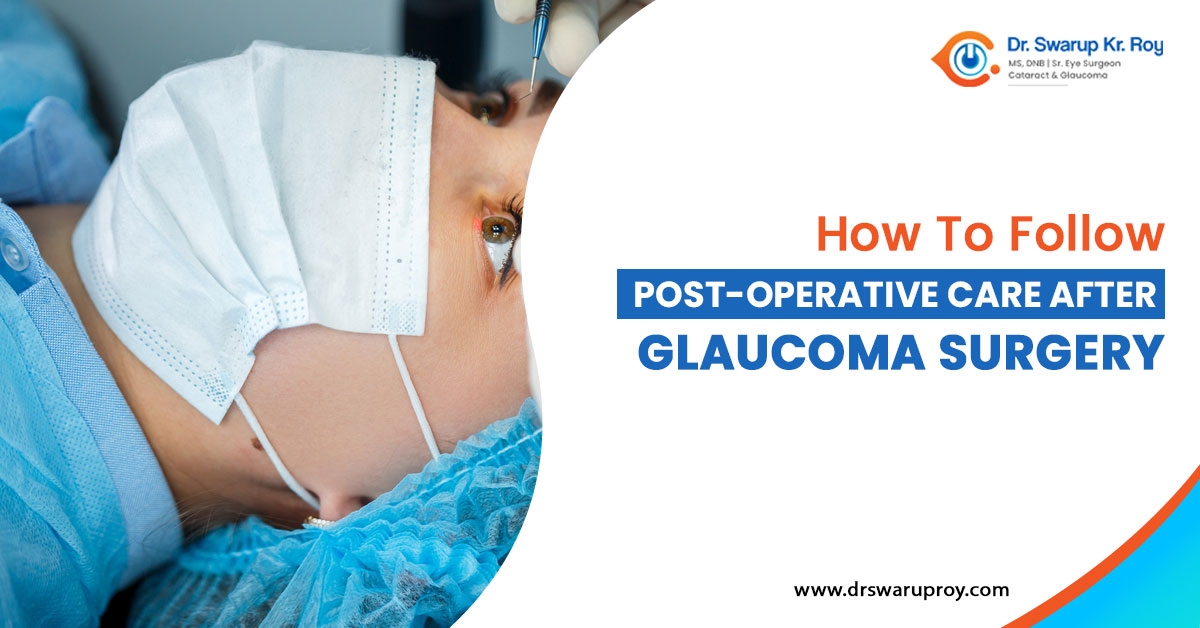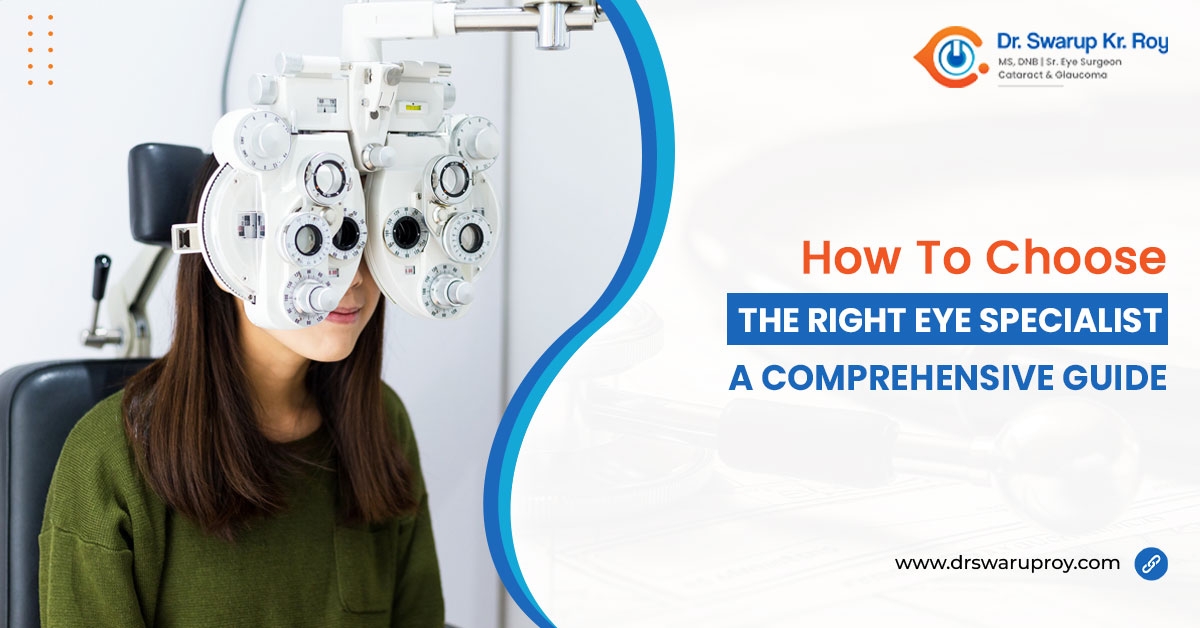Your eye sight is the most important senses in the body. It serves as the world's window and is also among the body's most sensitive areas. The most widespread misconception about eye exams is that they are only intended to determine the required strength of corrective lenses.
Regular eye exams are important for maintaining better eye health. An eye exam, however, involves much more than merely determining your vision. When you see them for an eye exam, a skilled eye specialist in Siliguri like Dr. Swarup Kr. Roy will examine more than just the surface of your vision.
What Makes Routine Eye Exams Important?
Preventing Eye Problems
It would help if you got regular eye exams to determine whether you have severe or sporadic "silent" problems that might impair your vision. With an eye exam, you can ensure that your eyes and eyesight are healthy and get early warning signs of age-related macular degeneration, glaucoma, cataracts, and refractive errors.
Finding Additional Illnesses
Regular eye examinations preserve your eyesight and help identify diseases like diabetes and cancer early on. An eye test may also be used to identify several hereditary problems in newborns and reveal severe conditions, including excessive blood pressure, high cholesterol, heart problems, or thyroid-related problems.
Preserving Eye Health
If you are aware of the value of eye care, you will recognize the significance of preserving the general health of your eyes. In everyday life, the eyes are exposed to a variety of factors. Consequently, maintaining the health of your eyes is difficult.
Do not wait for things to get worse. It is essential to see a professional eye specialist near you to learn about appropriate screen time, proper food, and eye relaxation to protect your eyes and preserve eye health.
How Frequently Should You Have Eye Exams?
The sole factor that determines whether a comprehensive eye exam is necessary or not is your present state of eye health. If you want to improve your eye health better, you need to consult Dr. Swarup Kr. Roy, our Siliguri-based eye specialist.
Adults should have a general health and vision evaluation of their eyes done by an eye doctor at least every two years. Individuals whose line of work demands them to pay close attention to details should have a thorough eye check-up more often than every two years.
The Advantages Of Regular Eye Exams
Evaluation of Dangers
Ophthalmologists often look for two common vision abnormalities: nearsightedness and farsightedness. The best method to determine whether you are nearsighted or farsighted is to get regular eye examinations.
Examine Any Possible Blindness
In more than 75% of instances, blindness may be prevented with early identification. Over 50% of blindness cases are preventable. As a result, it's critical to maintain your eye health by getting frequent exams.
Aids in Preventing Deadly Illnesses
Routine eye exams may identify multiple potentially fatal disorders. An eye specialist may examine the retina's blood vessels, which provide valuable insights into the health of the body's other blood vessels. One may use changes in the appearance of the retinal blood supply and blood vessels to diagnose a patient's condition.
Methods and Procedures for Eye Exams
Regular eye exams are essential to keeping your eyes healthy and identifying any problems early. During an eye exam, our eye specialist in Siliguri performs several tests that are carried out to assess the general health of the eyes and identify any visual issues.
Thorough Eye Exams
Comprehensive eye examinations include several tests to assess vision and the general health of the eyes and a comprehensive examination of the eyes. Depending on age, medical history, and risk factors, these checks typically take one to two hours to perform and are advised every one to two years.
Procedure Specifics
The examination begins with a review of the patient's ocular and medical history. An ophthalmoscope is used to examine the retina, optic nerve, and blood vessels in the eye to assess the eyes' health.
Methods Used In Every Examination
A thorough eye exam employs several methods, such as:
Testing Visual Acuity: This examination is used to determine your visual acuity. Your visual acuity will be assessed by having you read letters on an eye chart; the smallest letter you can read will be your score.
Refraction Testing: This examination aids the physician in determining whether you need contact lenses or glasses. An eye specialist in Siliguri like Dr. Roy will decide the appropriate prescription for you after measuring how much light enters your eyes using a phoropter.
Eye Movement Testing: This examination measures how effectively your eyes can move to track an item in motion or change between things.
Assessment of Students: The size and response of the pupils are measured to determine whether there are any problems with the neurological system or how the eyes work.
Eye Pressure Testing: This examination looks for glaucoma, a disorder that, if unchecked, may harm the visual nerve.
How Often Eye Exams Are Necessary Per Age Group?
Have regular eye exams to keep your eyesight in good condition and avoid vision issues. The number of needed eye examinations varies based on an individual's age and personal risk factors. Usually, scheduling an eye exam yearly is important by age group and the factors that influence their schedules.
Children should get eye examinations since visual issues might hinder their growth and ability to study. Experts advise that children get their first eye examination at six months of age, then again at three years old, and before beginning first grade.
Children with additional risk factors or a family history of eye issues may need more regular examinations. School children should receive an eye exam every two years, or more often if they have risk factors or visual issues. Children with vision issues may have trouble studying, reading, and doing well in sports.
Depending on their risk factors, adults between 19 and 64 should get eye exams every one to two years. Those with a history of eye issues or chronic conditions like diabetes or hypertension might need regular eye checkups. Frequent eye examinations can identify conditions like glaucoma, and macular degeneration, which, if unchecked, may result in visual loss.
Seniors should have an eye checkup annually to check for age-related eye conditions, including macular degeneration and cataracts, which are more prevalent among the elderly. Frequent eye examinations by an eye specialist near you may also assist in identifying underlying medical conditions that may affect vision, such as diabetes and hypertension.
An individual's age and unique risk factors determine how often they need to get eye exams. Early vision testing should begin at six months, and school-age children should get an eye checkup every two years.
Every one to two years for adults between the ages of 19 and 64, and annually for seniors, is when they should undergo an eye checkup. Frequent eye examinations may aid in the early detection of underlying medical conditions and eye illnesses, improving treatment results.
Ensure your vision stays crystal clear! Schedule your eye exam with Dr. Swarup Kr. Roy today for comprehensive eye care and early detection of eye issues. Your eyes deserve the best care!
Comments (0)





